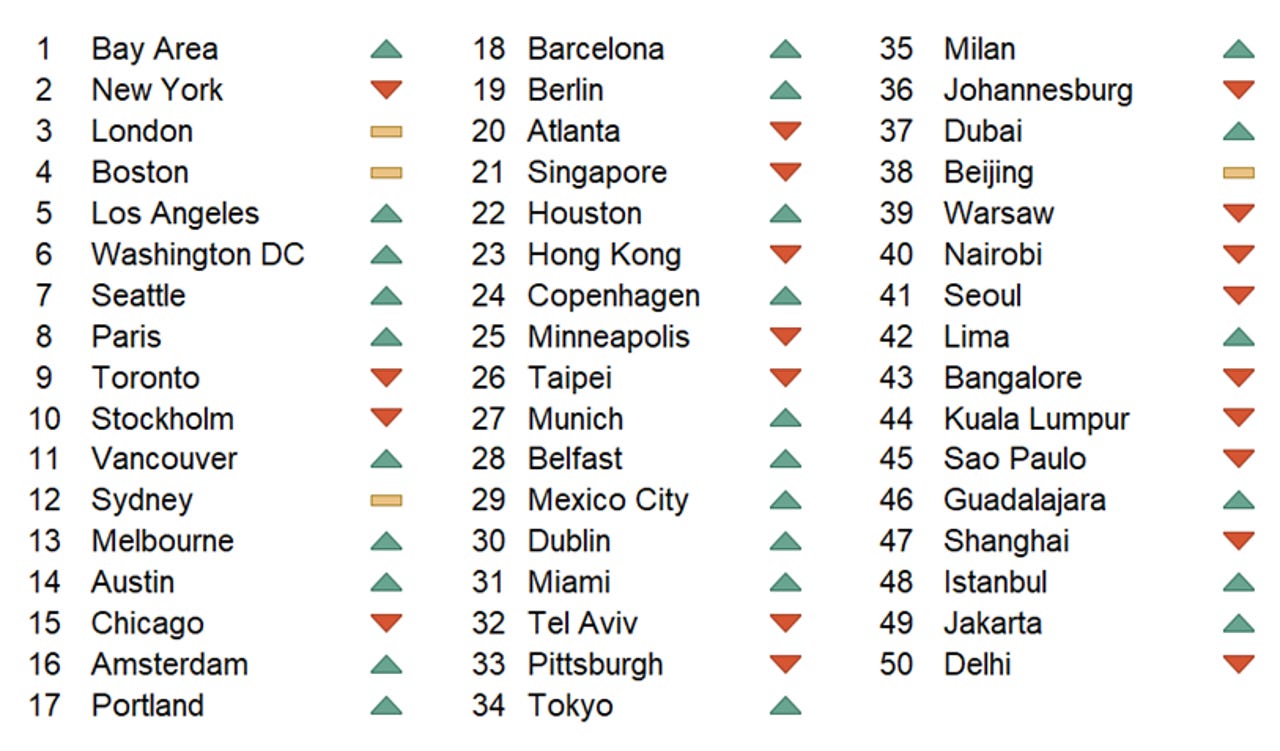Dell Technologies crowns the Bay Area as the best city for women entrepreneurs

Dell Technologies has made available the results of its 2019 Women Entrepreneur Cities (WE Cities) Index, ranking 50 global cities based on their ability to foster the growth of women-owned businesses.
The San Francisco Bay Area outranked New York for the number one spot this year, largely in part, Dell Technologies said, because the Bay Area is one of the best places for women to gain access to capital.
Announcing the results at the Dell Women Entrepreneur Network (DWEN) Summit in Singapore on Monday, president of Asia Pacific & Japan, Global Digital Cities at Dell Technologies Amit Midha said all 50 cities made progress since 2017, but there is still a lot of work to do.
"When more women work, economies grow. Technology is helping to drive this progress as a gender-neutral enabler, and helps create a level playing field," he said. "Whilst all cities in the Index have improved, the crucial factor is the consistency of this improvement across the different factors that impact women entrepreneurs' success."
SEE: Transgender employees in tech: Why this "progressive" industry has more work to do to achieve true gender inclusivity (TechRepublic cover story)
Conducting the research since 2010, the company ranks cities based on the impact of local policies, programs, and characteristics, in addition to national laws and customs to help improve support for women entrepreneurs and the overall economy.
In scoring each of the cities, Dell Technologies looked at access to: Capital, technology, talent, culture, and markets, with those pillars organised into two groups -- operating environment and enabling environment.
The overall rating is based on 71 indicators -- 45 of which have a gender-based component. Individual indicators were also weighted based on four criteria: Relevance, quality of underlying data, uniqueness in the index, and gender component.
Out of a total of 100 possible points, the number one ranked San Francisco Bay Area scored only 63.7.
"That's evidence that there is still much work to do to level the field for women -- and validates the need for this kind of research and outreach to policymakers to move the needle for female founders," the company said.
"Lack of funding, high-cost of living, low representation of women in leadership roles, and the lack government-led policies that support women entrepreneurs were among the barriers, globally."
30 out of 50 cities improved on more than half of their indicators, with Latin America and Europe seeing the highest percentage of their cities move up. Mexico City had the greatest improvement ranking 45 in 2017, and moving up to 29 this year.
Behind the Bay Area was New York in second, followed by London, Boston, Los Angeles, Washington DC, Seattle, Paris, Toronto, and Stockholm to round out the top 10.
Australia had Sydney and Melbourne in twelfth and thirteenth position, respectively, while Singapore in position 21.
"When we invest in women, we invest in the future; communities prosper, economies thrive, and the next generation leads with purpose," Dell Technologies EVP and chief customer officer Karen Quintos said.
"By arming city leaders and policymakers with actionable, data-driven research on the landscape for women entrepreneurs, we can collectively accelerate the success of women-owned businesses by removing financial, cultural, and political barriers."
While Quintos said the good news is that every one of those 50 cities over the last several years have actually increased their score, which translates global progress and momentum, she highlighted a need to look at the numbers.
"San Francisco overtook New York for the very first time in the number one spot. This was largely due to the big improvements in San Francisco's culture ranking. Which in my opinion shows that the public dialogue on eliminating the bro culture and increasing funding and innovation is really starting to have a significant impact," she reiterated during her presentation at DWEN.
"While all of this progress is so encouraging to see, one of the things we have to keep in mind is that the top city of San Francisco got a score of 63.7 out of a total score of 100. Where I come from, that translates into a D. There is still so much work that we need to do and so much improvement across the board."
Based on the findings and comparison between the 2017-2019 indices, Dell Technologies developed a set of WE Cities Policy Recommendations focused on three areas.
They are access to, and the development of, financial and human capital; private and public sectors role in increasing access to local and global networks and markets; and how government and business leaders can help women entrepreneurs thrive in the changing-face of technology.

2019 WE Cities Index Rankings
Disclaimer: Asha Barbaschow travelled to DWEN as a guest of Dell Technologies
RELATED COVERAGE
'There's a culture that works against women': Changing the face of tech startups
Paris-based social entrepreneur Chiara Condi aims to transform lives by helping more women create startups.
Advocating for women entrepreneurs: Dell proposes 3 areas for change (TechRepublic)
The company believes these three key learnings, if supported by local governments, can add up to big changes for women-owned businesses globally.
Why having more women in tech management is good for business (TechRepublic)
Johanna Mikkola, CEO of coding bootcamp Wyncode, pointed out that businesses create better products when development teams are more reflective of end users.
Women in tech: Career tips for female IT pros and diversity resources for employers (TechRepublic)
Women who are pursuing careers as tech leaders, developers, and other IT roles should check out these useful resources. Employers can learn how to address the gender pay gap, biases, and more.
Why is Russia so good at getting women into technology?
A century ago, Russia pushed for equal rights to education and work for men and women. The effects are still being felt in tech today.